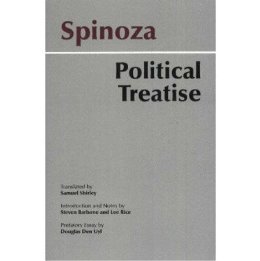Spinoza, Baruch. Political Treatise. Edited by Jonathan Israel. Indianapolis: Hackett Publishing Company, 2000.
Written near the end of his life, Spinoza’s Political Treatise diverges from the speculative metaphysics of his Ethics and focuses on the practical realities of political governance. While Spinoza champions democracy as the most natural and stable form of government—rooted in the equality and rational capacities of all individuals—he also acknowledges the necessity of concentrated power under certain circumstances to maintain peace and security.
In essence, Spinoza’s Political Treatise is a remarkable synthesis of idealism and realism. It envisions a society where rational cooperation leads to collective flourishing, yet it never loses sight of the pragmatic demands of governance in a world filled with passionate, imperfect individuals.
Excerpt:
1. PHILOSOPHERS conceive of the passions which harass us as vices into
which men fall by their own fault, and, therefore, generally deride,
bewail, or blame them, or execrate them, if they wish to seem unusually
pious. And so they think they are doing something wonderful, and
reaching the pinnacle of learning, when they are clever enough to bestow
manifold praise on such human nature, as is nowhere to be found, and to
make verbal attacks on that which, in fact, exists. For they conceive of
men, not as they are, but as they themselves would like them to be.
Whence it has come to pass that, instead of ethics, they have generally
written satire, and that they have never conceived a theory of politics,
which could be turned to use, but such as might be taken for a chimera,
or might have been formed in Utopia, or in that golden age of the poets
when, to be sure, there was least need of it. Accordingly, as in all
sciences, which have a useful application, so especially in that of
politics, theory is supposed to be at variance with practice; and no men
are esteemed less fit to direct public affairs than theorists or
philosophers.
2. But statesmen, on the other hand, are suspected of plotting against
mankind, rather than consulting their interests, and are esteemed more
crafty than learned. No doubt nature has taught them, that vices will
exist, while men do. And so, while they study to anticipate human
wickedness, and that by arts, which experience and long practice have
taught, and which men generally use under the guidance more of fear than
of reason, they are thought to be enemies of religion, especially by
divines, who believe that supreme authorities should handle public
affairs in accordance with the same rules of piety, as bind a private
individual. Yet there can be no doubt, that statesmen have written about
politics far more happily than philosophers. For, as they had experience
for their mistress, they taught nothing that was inconsistent with
practice.
Online:
Amazon
